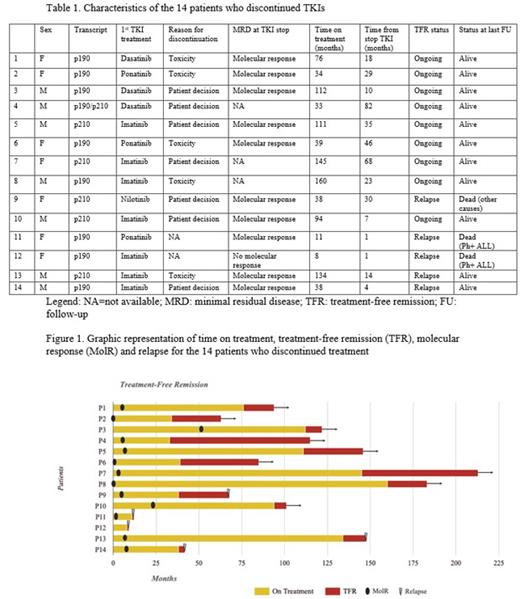Introduction. Philadelphia-positive acute lymphoblastic leukemia (Ph+ ALL) patients are commonly treated with tyrosine kinase inhibitors (TKI) in combination with either steroids, chemotherapy and more recently also immunotherapy. In the past, allogeneic transplant (SCT) was considered the only curative option; however, with the introduction of more potent TKIs as well as immunotherapy this milestone is nowadays debated, mostly for patients who achieve a molecular response. Moreover, as in chronic myeloid leukemia (CML), it is becoming relevant to understand if patients may over time discontinue TKI treatment. For this purpose, it is pivotal to report the outcome of Ph+ ALL patients who, for any reason, stopped TKI treatment.
Patients and Methods. Forty-seven adult Ph+ ALL patients treated since 1 January 2000, and who did not undergo a SCT, were retrospectively collected from 12 Italian centers participating to the Campus ALL network. Their treatment plan included a TKI +/- chemotherapy according to the center current practice and/or according to the ongoing national trial they were enrolled in. The median age was 63 years (20-84), 20 patients (43%) were males, 30 patients harbored a p190 transcript, 15 a p210 transcript and 2 had both transcripts. Twenty-six patients were treated within a trial, while 21 were off-protocol. For 32 patients, induction was based only on a TKI plus steroids, whereas the remaining 15 received a combination of a TKI plus chemotherapy (in 3 cases high intensity protocols such as the NILG (Northern Italian Leukemia Group) and HCVAD regimens, in 12 low dose chemotherapy). The reasons not to transplant patients were: donor unavailability (5), clinical decision, mainly due to age/unfitness (30), patient's refusal (4), and achievement of a molecular response (i.e. at least BCR-ABL/ABL ≤0.01%) (8). The median follow-up was 60 months, with a median overall survival (OS) not reached at the last follow-up and a median disease-free survival (DFS) of 12 years. At the last follow-up, 12/47 patients had experienced a relapse. At the end of the induction (i.e. after 3 months, at a median of +82 days, from treatment initiation), 27 patients had achieved a molecular response. Overall. a molecular response was obtained in 40/46 pts (data not available for 1 case) after a median of 5 month, and was associated with a significantly lower hazard of disease recurrence (HR=0.057, 95% CI: 0.006-0.51, p=0.011) after adjusting for gender, fusion protein, association with chemotherapy, CMR at 3 months.
Results. TKI treatment was discontinued in 14 of the 47 patients evaluated. The reasons for discontinuation were either toxicity (6) or clinical/patient decision (8). Eight patients harbored a p190 transcript, 5 a p210 transcript and 1 carried both. At the time of discontinuation, the median age was 75 years (23-87) and patients had been on a TKI for a median of 57.5 months (8-160) prior to stopping treatment. For these cases, the median WBC at diagnosis were 8.6 x 10 9/l (2.1-306 x 10 9/l). In 7 patients the first TKI used was imatinib, in 3 dasatinib, in 3 ponatinib and in 1 nilotinib. All patients but 1 had achieved a molecular response before stopping treatment; the only patient who never achieved a molecular response prior to discontinuing the TKI had a rapid relapse (1 month). At the last follow-up, 9 cases were still in treatment-free remission (TFR), whereas 5 eventually relapsed after 1, 1, 4, 14 and 30 months, respectively. Re-challenge with a TKI led to a hematological and molecular response in 3 of the 5 patients. The remaining 2 patients, who had been previously heavily treated and whose TFR was of only 1 month, received salvage standard chemotherapy but eventually died from ALL progression. The median time of TFR for the entire cohort of 14 patients was 20.5 months (1-82). When considering only the 9 patients who remain off treatment, the median time of TFR was 29.5 months (7-82) (Table 1, Figure 1).
Conclusions. We report the outcome of 14 Ph+ ALL patients who discontinued TKI treatment due to various reasons. Nine of them are still on TFR after more than 2 years at the last follow-up, reinforcing the concept that a TFR is feasible in selected adult Ph+ ALL patients. Of further relevance, TKI re-challenge was successful in 3/5 patients who relapsed, similarly to what observed in CML.
Disclosures
Cerrano:Insight Novartis Servier Abbvie Janssen Jazz Astellas Italfarmaco: Honoraria. Mulè:Astellas: Honoraria; Pfizer: Honoraria; Incyte: Honoraria; ABBVIE: Honoraria. Papayannidis:Abbvie, Astellas, Servier, Menarini/Stemline, BMS, Pfizer, Amgen, Janssen, Incyte, Novartis: Honoraria; Pfizer, Astellas, Janssen, GSK, Blueprint, Jazz Pharmaceuticals, Abbvie, Novartis, Delbert Laboratoires: Membership on an entity's Board of Directors or advisory committees. Abruzzese:Takeda: Consultancy; Pfizer: Consultancy; Novartis: Consultancy, Membership on an entity's Board of Directors or advisory committees; Incyte: Consultancy, Membership on an entity's Board of Directors or advisory committees; BMS: Consultancy, Membership on an entity's Board of Directors or advisory committees. Fracchiolla:Abbvie, Jazz, Pfizer, Amgen: Speakers Bureau; Abbvie, Jazz, Pfizer, Amgen: Other: travel grants. Chiaretti:Gilead: Membership on an entity's Board of Directors or advisory committees; Abbvie: Membership on an entity's Board of Directors or advisory committees; Amgen: Membership on an entity's Board of Directors or advisory committees; Incyte: Membership on an entity's Board of Directors or advisory committees; Pfizer: Membership on an entity's Board of Directors or advisory committees.


This feature is available to Subscribers Only
Sign In or Create an Account Close Modal